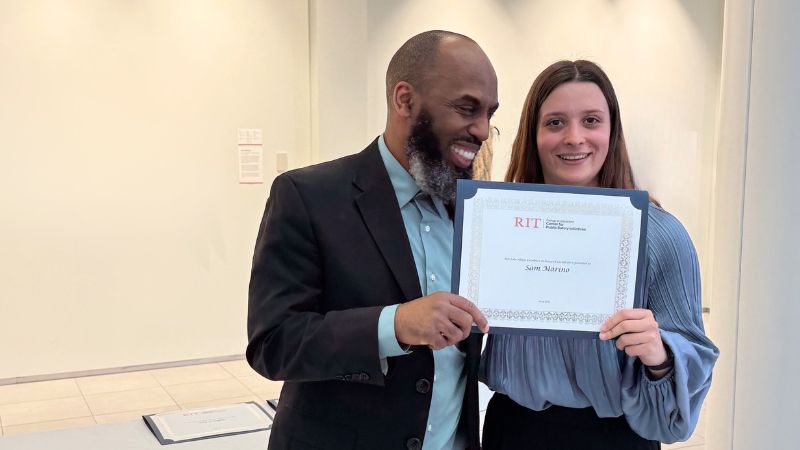Assistant DA Lauds RIT’s Criminal Justice Faculty for Outstanding Support
From student to senior assistant district attorney: Ryan Lamon credits RIT's supportive faculty and diverse opportunities for his journey to success in the criminal justice field.

Since the age of five, Ryan Lamon was sure that he wanted to be a police officer. The further he got into his criminal justice degree at RIT, however, the more he realized that many other roles would fulfill his desire to help within the law enforcement community. After approaching RIT faculty with his broadening interests, he was overwhelmed by the support he received. “I can’t speak highly enough about the faculty in the criminal justice program,” he said. “They’re so open to helping students that it’s almost like talking to a colleague versus a professor. And they are so ready and willing to put their personal time aside to come to events and allow their connections to be used for your benefit.”
Presently, Lamon is a senior assistant district attorney for the Monroe County Office of the District Attorney. He chose RIT because of its name recognition and the reputation of its criminal justice program. The size of his classes, some being fifteen students or less, led to personal attention and relationships with faculty. “I thought I was going to just be a number, but the professors knew who I was,” he said. “Their help allowed me to grow professionally and also personally.”
Lamon’s internship with the U.S. Marshals Service helped him prepare for his current position. “I loved it,” he said. “I’m still in contact with the marshal who was my intern supervisor. He opened my eyes to all the different routes I could take, which inevitably led me to law school at Penn State Law.” One of the benefits Lamon gained was seeing the interaction between different law agencies and the courts and the exposure to several task forces, all of which gave him an edge at his current job prosecuting felons in Monroe County. He is currently assigned to the Public Integrity and Economic Crimes Bureau, which includes issues such as embezzlement and large thefts.
Not a believer in “all work, no play,” Ryan participated in several extracurricular activities at RIT, including the club soccer team. “I still play in an adult league with people I went to RIT with,” he said. Lamon also was a member of the Student Advisory Board. “The best thing about this board was hearing opinions directly from students, having a dean open to hearing us out, and being a catalyst for positive change. It was a cool experience to be able to take students' requests and ideas to someone who could make them happen, and oftentimes did.”
When asked what it was like to be a liberal arts major at a university known for technology, Lamon said, “RIT did a great job balancing social and hard sciences. We would go over empirical data but also get the human element. It made me more well-rounded. I would describe RIT’s College of Liberal Arts as a combination of the small school feel with professors who care about you, and the resources of a giant institution with national reach.”











